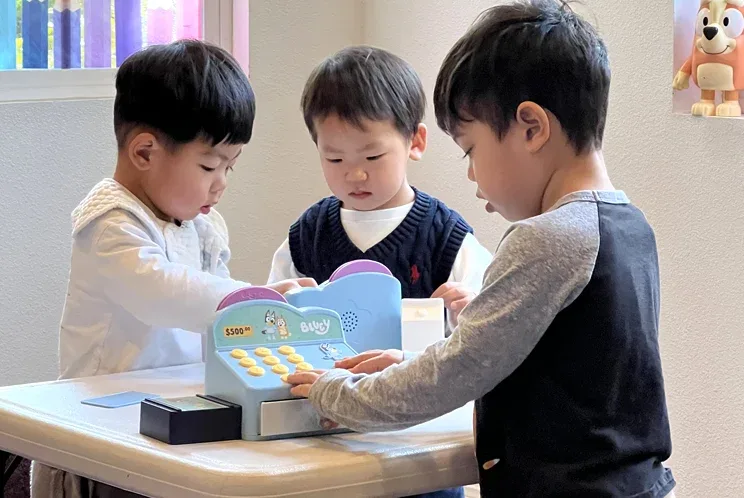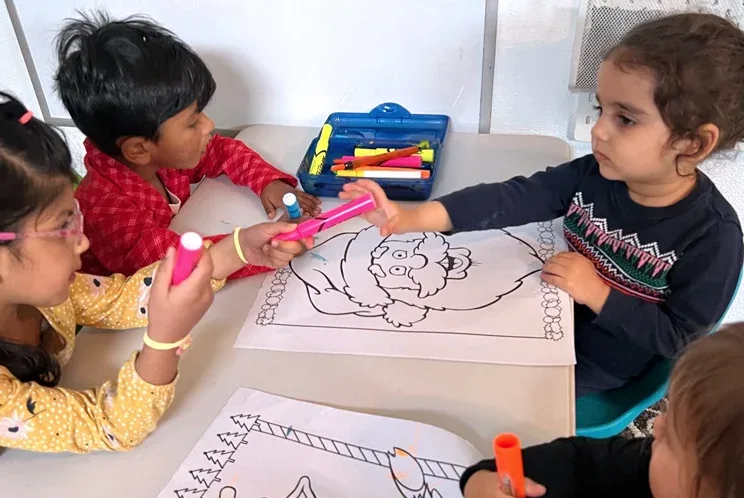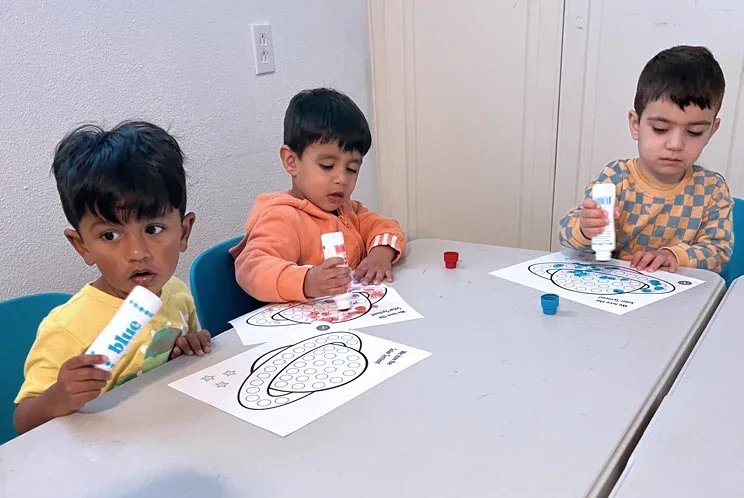
Did you know that a child’s brain develops faster in the first five years than at any other time in life? Early childhood education is one of the most important investments in a child’s future.
It’s more than just playtime, it’s a structured, nurturing approach to helping young children grow intellectually, socially, and emotionally during their most critical developmental years.
In this post, you’ll discover the key benefits of early childhood education, the critical developmental stages it supports, and how starting young can positively shape a child’s academic, emotional, and social future. We’ll also examine how DeeCyDa’s tailored programs help nurture young minds during these formative years.
Contents
- 1 What Is Early Childhood Education?
- 2 Cognitive Benefits of Starting Early
- 3 Social and Emotional Development
- 4 Physical Development and Motor Skills
- 5 Long-Term Academic and Career Outcomes
- 6 Emotional Security and Routine
- 7 Parental Involvement and Community Support
- 8 How DeeCyDa Supports Early Learning at Every Stage
- 9 FAQs: Early Childhood Education
- 10 Final Thoughts: Invest Early in Your Child’s Future
What Is Early Childhood Education?
Early childhood education (ECE) refers to the structured teaching and care provided to children from infancy through age 8, typically covering daycare, preschool, and early elementary years.
The primary goal of ECE is to support young children’s cognitive, emotional, social, and physical development during their most formative years.
It lays the groundwork for lifelong learning, behavior, and well-being by fostering curiosity, independence, and foundational academic skills in a nurturing, age-appropriate environment.
Age Range and Developmental Focus
Early childhood education generally begins at 12 weeks and extends through early primary school (up to age 8). During this period, the focus is on key developmental milestones such as language acquisition, emotional regulation, motor skills, and early literacy and numeracy.
Programs are typically divided into age-specific groups, like infants, toddlers, and preschoolers, to ensure that activities and teaching methods are tailored to each growth stage.
Educational Methods Used in Early Years
ECE programs often use play-based learning, Montessori-inspired approaches, Reggio Emilia, and other age-appropriate models emphasizing hands-on exploration and social interaction. Teachers use activities such as storytelling, music, art, sensory play, and group games to promote development that feels natural and engaging to children. The environment is designed to encourage curiosity, collaboration, and problem-solving.
How DeeCyDa Tailors Programs for Early Learners
DeeCyDa offers a structured yet nurturing approach to early education through their Caterpillar and Butterfly Programs, which are carefully crafted to align with each child’s developmental stage.
The Caterpillar Program focuses on toddlers, encouraging social, emotional, and motor skill growth through sensory play and structured routines.
The Butterfly Program builds on this foundation for preschoolers by introducing early academic concepts, language enrichment, and creative expression. DeeCyDa’s diverse curriculum and caring educators ensure that every child receives personalized support and a joyful learning experience.
Cognitive Benefits of Starting Early
Ever notice how effortlessly young children absorb words, ideas, and even languages? That’s because the early years are a time of rapid brain growth, when neural connections form at lightning speed. High-quality early childhood education takes full advantage of this window, boosting language and literacy skills through storytelling, songs, and interactive dialogue that expand vocabulary and comprehension.
It also nurtures problem-solving and logical thinking, helping children make sense of patterns, cause and effect, and basic reasoning through play and exploration. These early cognitive developments and experiences lay a powerful foundation for lifelong learning, making it easier for children to adapt, focus, and thrive in formal schooling and beyond.
Social and Emotional Development
Imagine a classroom where toddlers learn to share toys, take turns, and express their feelings with words instead of tears. That’s the heart of social and emotional growth in early childhood education. Group-based learning environments provide children with daily opportunities to develop friendships and empathy as they begin to understand others’ perspectives and emotions through guided play and interaction.
At the same time, these settings foster emotional regulation and independence by helping children recognize their feelings, manage frustration, and make simple choices independently. These early lessons in cooperation, self-awareness, and confidence are just as important as ABCs and 123s, setting the stage for healthier relationships and strongemotional resilience throughout life.
DeeCyDa’s Approach to Social-Emotional Growth
Social-emotional development is a cornerstone of this early childhood care and learning Center’s educational philosophy. DeeCyDa recognizes that emotional intelligence and interpersonal skills are as vital as academic readiness, So It integrates social-emotional learning (SEL) throughout its programs.
Building Friendships and Empathy
From the earliest stages in the Caterpillar Program (ages 1–2.9), children engage in play-based activities that encourage sharing, cooperation, and understanding others’ feelings. These interactions lay the groundwork for developing empathy and forming meaningful friendships.
Emotional Regulation and Independence
As children progress to the Butterfly Program (ages 3–4.9), they focus on helping them recognize and manage their emotions. Through structured routines and guided activities, children learn to express themselves appropriately and build confidence in their abilities, fostering independence.
DeeCyDa’s commitment to social-emotional growth ensures that children are prepared academically and equipped with the emotional tools necessary for lifelong success.
Physical Development and Motor Skills
Early childhood education programs do more than prepare children academically, they support physical growth through structured, intentional activities that develop strength, coordination, and body awareness.
Motor Skills Activities in Early Childhood Learning
Young children refine fine motor skills through activities like using tweezers to pick up small objects, buttoning dress-up clothes, or shaping clay. These exercises strengthen the small muscles in their hands and fingers, laying the foundation for writing, self-feeding, and dressing independently.
At the same time, gross motor development is encouraged through balance beams, tricycle riding, jumping games, and movement songs that get children using large muscle groups in coordinated ways.
Nutrition and Physical Wellness
Many early education settings incorporate routines that support physical wellness. Children learn the importance of eating nourishing foods through visual food models, discussions during snack time, or themed weeks like “Healthy Bodies.” Programs often include scheduled water breaks, hygiene routines like hand-washing songs, and discussions about rest and movement to instill body awareness and self-care habits from a young age.
Play-Based Learning as Physical Growth
Movement-based play is intentionally used to support physical development. Obstacle courses are designed not just for fun but also to build agility and coordination. Group games like “Simon Says” or dance parties help children practice motor planning and control.
Educators also use free play observations to track physical milestones and offer variations or challenges that promote growth, ensuring physical development is integrated into the learning experience, not treated separately.

Long-Term Academic and Career Outcomes
Children who engage in quality education benefit not just in the moment but often carry those advantages well into adolescence and adulthood.
Research consistently shows that early learners are more likely to succeed academically, adapt socially, and build the skills needed for long-term personal and professional achievement.
Higher Graduation and College Admission Rates
Studies have found that children who attend structured early learning programs are more likely to complete high school and pursue higher education.
Early exposure to classroom routines, collaborative learning, and foundational academic skills smooths the transition to formal schooling, increasing confidence and performance in later grades.
These early learners tend to stay on track academically and are more likely to meet key benchmarks like standardized testing and college admissions.
Improved Cognitive and Social Adaptability
Early education nurtures literacy, numeracy, and executive functioning skills, like memory, focus, emotional regulation, and problem-solving, that are crucial for adapting to new learning environments.
Children who develop these skills early tend to navigate academic and social challenges more effectively, making them better prepared for the evolving demands of school and, eventually, the workplace.
Studies Supporting Early Start Advantages
Long-term studies such as the Perry Preschool Project and the Abecedarian Project have tracked students over decades and found that those who received early childhood education were more likely to earn higher incomes, hold steady employment, and avoid involvement with the criminal justice system.
These findings highlight that early learning isn’t just about short-term school readiness; it’s a long-term investment in a child’s future stability and success.
Emotional Security and Routine
A nurturing early learning environment provides young children with emotional security and meets their evolving needs. At this stage of development, predictability and warmth help reduce anxiety and foster confidence. Consistent daily routines, such as morning greetings, structured activity blocks, snack times, and rest periods, help children feel safe and know what to expect.
This sense of order supports emotional regulation and trust in caregivers. In well-designed programs like DeeCyDa’s, the environment is carefully crafted to feel like a home-away-from-home, offering comfort, familiarity, and positive emotional connections. Key elements that contribute to emotional stability in early learners include:
- Consistent routines that reinforce structure and reduce uncertainty
- Caring and responsive educators who build relationships based on safety and trust
- Comforting classroom environments that mimic the warmth and security of home
Parental Involvement and Community Support
Effective early childhood programs recognize that education thrives when families and communities are involved. By building strong relationships between parents, teachers, and the wider community, these programs create a supportive environment that extends far beyond the classroom. Here’s how they foster meaningful engagement:
- Parent-Teacher Collaboration: Ongoing communication between parents and educators, through conferences, daily reports, and digital updates, ensures everyone is aligned on a child’s needs, progress, and goals. This partnership allows for a more personalized learning experience and encourages consistency between home and school.
- Events and Activities for Family Involvement: Programs often organize events like literacy nights, cultural celebrations, classroom volunteering, and parent workshops. These activities allow families to engage directly with their child’s learning environment, build relationships with teachers, and connect with other parents.
- Creating a Village for Your Child: Early education centers help build community by fostering connections among families, staff, and local organizations. This network offers emotional and practical support, creating a “village” where children feel secure and families feel empowered to participate in their child’s development.
How DeeCyDa Supports Early Learning at Every Stage
DeeCyDa Child Care & Learning Center offers a comprehensive, stage-based approach to education that grows with each child, from infancy through adolescence. Their programs are thoughtfully designed to meet the developmental needs of every age group, blending academic foundations with emotional, social, and practical life skills.
- Caterpillar & Butterfly Programs: The Caterpillar Program (ages 1–2.9) focuses on early developmental milestones such as motor skills, social interaction, and basic language exposure. As children grow, they transition into the Butterfly Program (ages 3–4.9), where the emphasis shifts to school readiness with activities that promote early literacy, numeracy, and social-emotional development in a nurturing, play-based environment.
- Advanced Butterfly Enrichment Options: For children who need additional stimulation or challenge, DeeCyDa offers advanced enrichment tracks within the Butterfly Program. These options include early STEM activities, creative arts, and project-based learning to cultivate curiosity and deeper engagement across subject areas, all while still maintaining age-appropriate delivery.
- Language Academy and Life Skills Programs: DeeCyDa extends learning beyond the early years with specialized programs for older children and teens. Their Language Academy introduces Spanish, Mandarin, Farsi, and American Sign Language, promoting multilingual development. For school-aged children, DeeCyDa’s Life Skills Programs offer practical education in communication, responsibility, problem-solving, and teamwork, equipping students with tools for real-world success.

FAQs: Early Childhood Education
Why is early childhood education important?
It supports brain development, builds social-emotional skills, and lays the foundation for academic success later in life.
Why are the first 5 years of child development so important?
Because the brain develops rapidly during this period, it forms critical neural connections that shape learning, behavior, and health.
At what age is a child most influenced?
The most influential age groups are 0–5, when children are most receptive to learning and their environment.
Does 90% of brain growth happen before kindergarten?
About 90% of a child’s brain develops by age 5, making early experiences crucial for long-term development.
What should parents look for in a quality early learning program?
Look for a safe, nurturing environment with skilled educators, age-appropriate curriculum, strong family communication, and a focus on both academic and emotional growth.
Final Thoughts: Invest Early in Your Child’s Future
The early years are more than a phase, they’re a powerful window of opportunity to shape how a child learns, thinks, and relates to the world. High-quality early childhood education builds the foundation for academic success, emotional resilience, and lifelong confidence.
By starting young, you’re not just preparing your child for school, you’re giving them a head start in life. Whether through structured learning, social development, or simply the joy of discovery, investing in these early stages is one of the most impactful choices you can make for your child’s future.
Looking for a trusted provider for your child’s early learning journey? Explore our nurturing and educational environment at our daycare center in Irvine.
Do you have thoughts or questions about early childhood education? Comment below. We’d love to hear your experiences or insights. Your perspective could help other parents and caregivers make informed choices for their children’s future!

